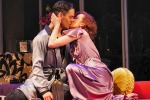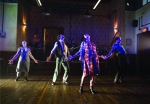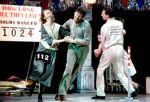
Private Lives, Lyceum Theatre, Edinburgh
14th February – 8th March
Francis O’Connor’s spectacular designs were worth the ticket price alone for this sparkling Noel Coward comedy.
This Wide Night, Tron Theatre, Glasgow
20th February – 15th March
Funny and heartbreaking, The Tron Theatre Company’s production of Chloe Moss’ This Wide Night was an eye-opening production.
And Then There Were None, Dundee Rep Ensemble, Dundee
5th March – 29th March
Visually stunning, the Dundee Rep Ensemble’s staging of this Agatha Christie masterpiece was a spine-tingling experience.
 A Perfect Stroke, Oran Mor, Glasgow/Traverse Theatre, Edinburgh
A Perfect Stroke, Oran Mor, Glasgow/Traverse Theatre, Edinburgh
31st March – 5th April (Oran Mor) 8th April – 12th April (Traverse)
After school rehearsals have never been so intimate and intense. A Perfect Stroke received a well deserved Best New Play nomination at the CATS awards earlier this year.
Beowulf, Tron Theatre, Glasgow
24th July – 2nd August
A fascinating set and a superb trio of actresses, this dramatic reading of Seamus Heaney’s Beowulf was a theatre experience to cherish.
 The Addams Family, Assembly Hall, Edinburgh
The Addams Family, Assembly Hall, Edinburgh
31st July – 25th August
Creepy, kooky and hilariously funny, this was my highlight of the Edinburgh Fringe Festival 2014 – full disclosure!
3rd – 11th October
A visual masterpiece in ways that simply cannot be captured in photographs, Vanishing Point’s Tomorrow was delicate and stunning.
 In Time O Strife, Citizens Theatre, Glasgow (tour)
In Time O Strife, Citizens Theatre, Glasgow (tour)
14th – 18th October
Poignant, angry and beautifully staged with a blend of poetry and music, this play was a testament to Scottish theatre.
 Dance Derby, Paisley Town Hall, Paisley (tour)
Dance Derby, Paisley Town Hall, Paisley (tour)
4th November
Beautiful, Brecht and thought-provoking theatre. I haven’t stopped talking about it yet.
 Top Hat, Theatre Royal, Glasgow (tour)
Top Hat, Theatre Royal, Glasgow (tour)
2nd – 13th December
A thrilling reminder of the golden days of Hollywood. Visual splendour and superbly cast. Tapping through the UK until July 2015.



